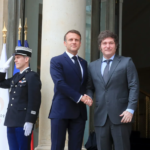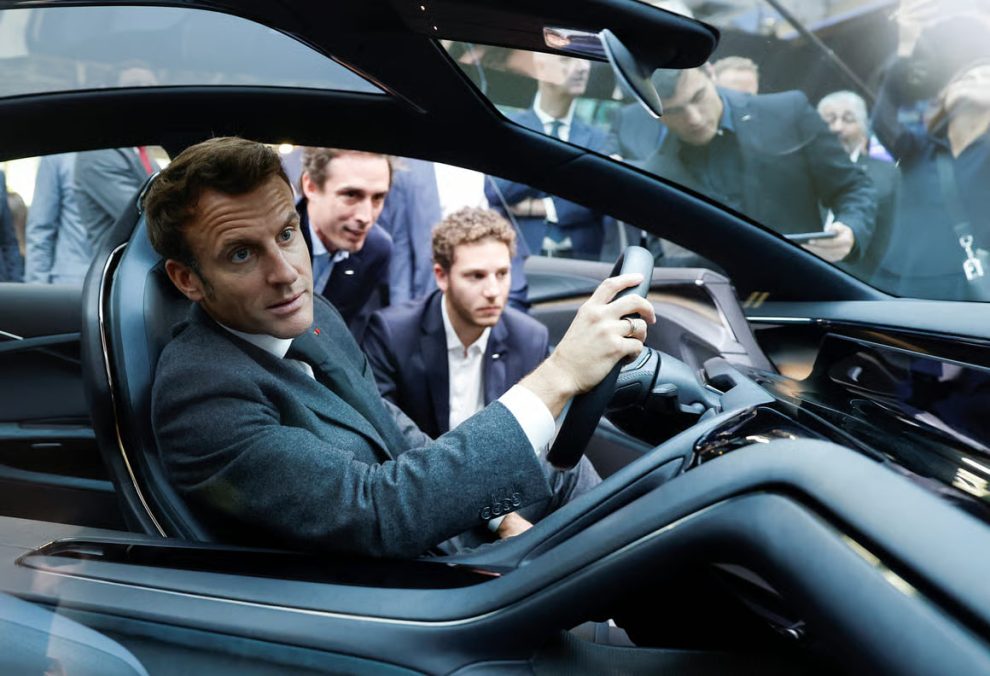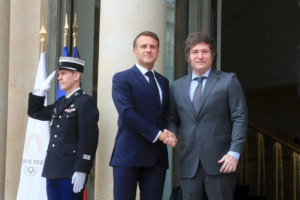French president takes first concrete step in countering Biden’s ‘Buy American’ green subsidies.
PARIS — Emmanuel Macron took his war of words with Washington to the mat Thursday by proposing a concrete counter to Washington’s electric car subsidies — a move likely to further heighten transatlantic tensions.
France, home to major carmakers like Renault and Stellantis, will tailor its existing measures that encourage green vehicle purchases to specifically reward European manufacturers by the end of this year, the president said, calling on the rest of the European Union to take similar action.
« We will be the first European country to reform the criteria for the allocation of the car bonus, » Macron said in a speech at the Elysée Palace during an event on re-industrialization, where EU Internal Market Commissioner Thierry Breton also took the floor. « It’s a small revolution that we want to bring to the European level, » Macron said.
Macron has been a combative voice hitting out at the subsidies under Joe Biden’s Inflation Reduction Act, which encourages consumers to « Buy American » when it comes to electric cars and offers other perks to the domestic green industry. He further stirred the pot with Washington last month after a visit to Beijing when he argued Europe should not act as « followers » of the U.S. when it comes to defending Taiwan from China.
The new French measures would, however, also take aim at China, which also subsidizes local carmakers.
« Why should we be the only space in the world that supports what is produced by competitors? We will not close the door to them, but since they already have uncooperative policies, we are not going to further help them with aid measures, » he said, referring to the fact that American and Chinese companies can currently benefit from French incentives for consumers who buy eco-friendly goods like electric vehicles and solar panels.
« This doesn’t mean that we are protectionist, we are not going to close the market, but we don’t want to use the French taxpayers’ money to accelerate non-European industrialization, » Macron added.
EU leaders are generally worried about Biden’s green subsidy scheme, fearing it will hinder production on the Continent and drive companies toward the U.S. to benefit from the $369 billion package. The European Commission has taken its concerns to the World Trade Organization, along with South Korea, Japan, China and Russia, arguing it unfairly discriminates against foreign manufacturers.
But France under Macron has played a more pronounced role as bad cop in talks with Washington meant to find a solution.
« We don’t want to depend; we are not meant to become consumers for the American industry, » Macron said Thursday.
The new measures will be part of an upcoming « green industry bill, » which is set to be adopted during a Cabinet meeting next week and go through parliament this summer. The text, proposed by Economy and Finance Minister Bruno Le Maire, will also include other measures inspired by the U.S. plan, such as tax credits for sectors including batteries, heat pumps, wind and solar power, which, according to Macron, could generate €20 billion in new investments by 2030.
« It will allow us to massively reduce imports of strategic parts from other countries … by doing this, we’ll realign with China and the United States, » Macron said.
China in the rearview mirror
While much of Brussels’ focus has been on the U.S. scheme’s impact on carmakers, many experts argue France has more to fear from Beijing than Washington when it comes to electric vehicles.
Tweaking clean car subsidies to make sure they only benefit local production is exactly the kind of policymaking car executives have been demanding for months to bolster their own efforts to counter both America’s investment splurge and China’s insurgent car brands.
Chinese carmakers — already global leaders in battery technology — have this year doubled down on efforts to crack open the European car market, with brands such as BYD, Nio and Great Wall ramping up their sales plans on the Continent.
“The French are most exposed to the Chinese automotive invasion because they are going straight for their price segment and local carmakers don’t have as much brand value like they do in Germany,” said Matthias Schmidt, an automotive market analyst.
That poses a major threat to European legacy brands, which are already encumbered by the costs of switching away from combustion engines under new EU rules that mandate a transition to only selling all-electric models by 2035.
That’s why Macron is now urging Brussels to adopt a similar approach to favor European battery production over foreign competitors.
« I do not want Europe to support batteries that are not made in Europe under its battery legislation, because neither the Americans nor the Chinese are helping batteries made in Europe, » he said.
Source: Politico





































